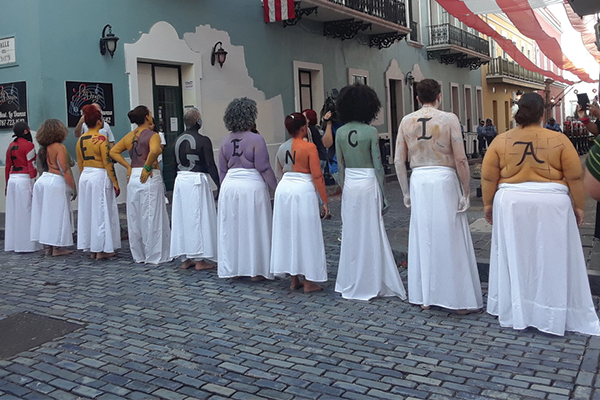Puerto Rico in Crisis: Restructuring Globalized Human Rights from the Grassroots to Account for Colonialism and Diaspora

By PhD Candidate Malia Lee Womack, Department of Women's, Gender and Sexuality Studies

In what ways do international human rights (for example: human rights institutions, frameworks and laws) reinforce global power structures? How can international human rights be restructured to be more accessible to all human beings? In what ways is the current human rights system exclusionary of Puerto Ricans?
Puerto Rico is the oldest existing colony in the world. The Island was first colonized by Spain in 1493 and then by the United States in 1898. The United States has subjected Puerto Ricans to significant human rights abuses over the span of US appropriation of the Island. Some human rights abuses Puerto Ricans have endured under US colonialism that are well documented in scholarship include sexist eugenic policies, military invasion, restricted self-determination, and surveillance, persecution and imprisonment.
Despite the United States’ profound historical and contemporary human rights violations against Puerto Ricans, the present human rights framework empowers the United States to dominate Puerto Rico. Under the current human rights system, the US is given the responsibility to define and monitor Puerto Ricans’ human rights, even though the US has been the primary violator of their human rights. There is a body of useful scholarship that explores human rights abuses against Puerto Ricans, but it fails to investigate how the human rights system should be redesigned to be more inclusive of their needs. My dissertation research strives to fill in this gap in the body of scholarship. It is especially important to address where Puerto Ricans are situated in the human rights system today.
In September 2017, Puerto Rico was devastated by Hurricane Maria, which is the worst natural disaster recorded in Puerto Rican history. The natural disaster is hindering Puerto Ricans’ access to basic human rights. I use an intersectional approach to question how the global human rights system should be transformed to be more inclusive and empowering to Puerto Ricans and other subjugated groups in order to make the system’s global reach stronger and more robust. My fieldwork is an ethnography that determines how Puerto Ricans (1) define human rights; (2) define their human rights priorities after the natural disaster; (3) envision how the human rights system should ideally be modeled; (4) envision how the human rights system should account for diversity and intersectionality within the collective identity Puerto Rican; (5) differentiate between Puerto Ricans’ needs for human rights on the island versus those who have migrated; and (6) view the relationship between grassroots movements and international human rights organizations and institutions.
